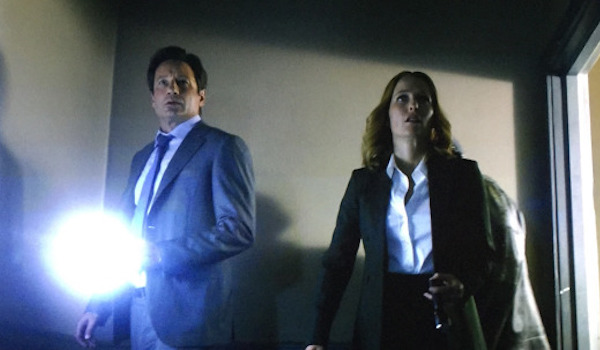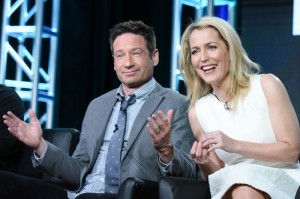 There is a palpable sense of dread in the performances of David Duchovny and Gillian Anderson as they are reunited, inevitably and seemingly against their will, in a latter day resumption of “The X-Files” (Fox, 10 p.m.).
There is a palpable sense of dread in the performances of David Duchovny and Gillian Anderson as they are reunited, inevitably and seemingly against their will, in a latter day resumption of “The X-Files” (Fox, 10 p.m.).
They were Mulder and Scully for nine seasons, as weird alien things happened all around them, and having tried to spend the last dozen or so years trying to establish their careers elsewhere, they seem to have realized they’d never really get away from their best known characters.
So here they are, supposedly resuming their inquiries 13 years after the old files closed up. What’s changed? The special effects are much better, such that a saucer can skid and crash into the earth. But the casting is a big questionable, as the comedian Joel McHale plays the role of the villain in the tedious first episode.
As during the earlier run of the show, the tone will change as the limited six episodes go by. Some, like tonight’s and the season finale, will deal with the over-arching mythology of the story. Monday’s episode will be a standalone; the one following will be so lighthearted it might be mistaken for comedy.
Some of the details of past shows (especially the movies) have been erased to allow the story to go forward (The Smoking Gunmen are back, for example). But the existence of “The X-Files” after 13 years shows the kind of cul-de-sac broadcasters seem to be in, reviving popular old titles (as they have and will again with “24” and “Prison Break”) in lieu of coming up with new stories.
 Duchovny and Anderson seemed no more thrilled to be at a panel for the TV Critics Association winter press tour than they seemed in the reboot.
Duchovny and Anderson seemed no more thrilled to be at a panel for the TV Critics Association winter press tour than they seemed in the reboot.
Anderson, who since moved to England and appeared in a number of roles, including the current version of “War and Peace” that will run opposite “The X-Files” on Monday, says she always saw her self in classier roles. “I was a huge fan of Merchant Ivory films, and I always kind of saw myself in something like a ‘Prime Suspect,’” she says. “So when I was cast in ‘The X-Files,’ it wasn’t the fact that it was science fiction, and it was just a little off to the left of where I had seen my career choices to be, and I got swept up into that.”
She returned to what she called “refocusing on what my original idea of what I wanted my career to look like and the kinds of things that I wanted to do,” Anderson said. “And I’m sure that part of that is you play a character for nine years and it’s nice to be able to challenge oneself to do other things.”
But eventually, it was time to return to Scully.
“I think it took me a long time to embrace it after we were done with the series. I think it took a good decade for me to suddenly start thinking of it as the gift that it was and to properly appreciate the opportunity that I had and also the how fortunate I was to play such a great iconic character in a show that was iconic in and of itself, and for such a long time and that it could have been something else — It could have been something that I hated or had bad reviews.
“So I was very lucky and I think it suddenly hit me some time later,” she says. She praised show creator Chris Carter for re-establishing the character and the series with the proper tone.
“I would agree with a lot of what Gillian says,” Duchovny says. “It took a while to recognize [the role] as the gift that it is, and that’s why we’re able to come back now.”
Having been seen so long as Mulder, he says, “acted as a spur to me to go out and actually do more work, to keep expanding myself as an artist or as whatever I am.”
For Carter, bringing back the series about paranoia and conspiracies in an era rife with both (as well as government spying, black ops, you name it) presented a new challenge.
“The ’90s were great,” Carter says. “It was still, for me, a sort of residual paranoia that came out of my young adulthood, out of Watergate and such. But we’re living in a time now when there’s a tremendous amount of distrust of authority, government, even the media. And so this is a really interesting time to be telling ‘X-Files’ stories.
“Conspiracy sites are chockablock with the most outrageous stuff,” he says, “but some of it actually is quite plausible.”
And that’s what helps fuel his writing. “I’ve kind of cherry picked through some of the things that are frightening to me, the prospect of them are frightening. And even if one of them comes true, it will be a bad thing for America and beyond. So this is a really interesting time to be shining lights into the darkness.”
Carter says he purposely mixed up the tone of the show this time. “That was the signature of the show was we would do a mythology episode, and then you could do a monster-of-the-week episode, and then you can do a comedy episode and go right back to a mythology episode, and it worked, and the audience went with you week to week, and the thing we became known for was our range, how the show could come right back to shape to its original concept.”
“In this case, there are only six episodes,” he says, “so we had to do it in a much shorter arc.”